Dexter Gordon - Ca'Purange (1972)
Dexter Gordon - Ca'Purange (1972)

1.Ca'Purange (9:50) 2.The First Time Ever I Saw Your Face (5:51) 3.Oh! Karen O (12:06) 4.Airegin (5:05) 5.Airegin (alt. take ) (5:32) Musicians: Dexter Gordon-tenor sax Thad Jones-trumpet,flugelhorn Hank Jones-piano Stanley Clarke-bass Louis Hayes-drums
At this time, Dexter was living in Paris. When he came to the States, Prestige would record him, part of a deal that would end in the early ‘Seventies. This one, from 1972, features an all-star band (including a fresh-faced Stanley Clarke) who challenge Dexter and benefit from his interplay. This one takes a little while to hit its stride, but when it does, you’ll probably find something you like.
“Ca’Purnage” is best know for the Gene Ammons version, where it was a bossa-flavored smoothie subtitled “Jungle Soul”. This is a different animal: Hank Jones starts the theme forcefully. While piano and horns play it slow and menacing, bass and drums go hyperactive and stay that way throughout the track. It’s a bit unsettling, and it sets your attention on the horns – which is the point. Dexter starts, and he follows piano rather then the drums, which are a little distracting here. He shoots little phrases to Hank, who answers in chords. He begins trilling, slurring his notes, getting faster the deeper he burns. Hank’s comping is warm and blankets Dex nicely. Hayes slows the drums, and Thad picks up on it, playing somber. Hank feeds him some chords, Thad goes faster, and the drums return to overdrive. Hank’s turn rings in full chords, chasing some of Hank’s gloom. He then takes us into a funky bar, and here the intensity matches the drums. On the fade, the horns trade a fanfare, leaving Hank to end on his own.
Hank’s pensive chords bring us “The First Time Ever I Saw Your Face” – and the ballad mastery of Dexter. His vibrato works overtime on the theme, and his high notes bring some unexpected heat. Thad picks up the flugelhorn; he is soft and gentle, spiraling upwards in a nice bit. The two join forces as they exit the theme, leaving on a memorable high note.
And now the blues. Hank gives you the back-alley feeling, and Dexter wails his despair. “Oh! Karen O” is a simple theme, but it’s not about her – it’s about Dex. He’s mostly low, thick with vibrato, but in the middle he struts about town, and the drums pick up the pace. He now sounds sharp, and he fires off little statements with authority. Thad’s horn is sedate; the blues have crushed him and the tempo is gone, Clarke’s slinky bass keeping it moving as the horn mopes. Thad’s big moment comes in a great stream of notes, a torrent of depression. His blue finally fades, and he weaves some happy threads through the end of his solo. Hank’s turn is beautifully understated, and the end gives a collective wail, as horns and Hank bemoan their fate together. It’s a great moment.
The disc ends with two versions of “Airegin”. The originally-released version has a Dexter solo that can only be called definitive. It darts, it moans, it races, it soars. Thad’s brief solo is very controlled, in long assured streams. Hank sticks to theme mostly, and Hayes’ busy solo is a highlight. The alternate has Dexter more growly, smearing notes and tearing the joint up. It’s totally different from the first version, and just as good. Thad’s solo sounds very spur-of-the-moment; many phrases end in mid-sentence. It has its moments, but the first solo was clearly better. Hayes’ solo this time is toms and snare; the cymbal (which made the first version) is barely touched. While I believe the right take was chosen for release, the alternate has its charms, especially in Dex’ solo. It’s an enjoyable album; when Dexter gets going, he really goes. But his fans already know that. ---John Barrett, allaboutjazz.com
